Executive summary
The purpose of this study is to explain the differences in corporate responsibility practices in contrast between European and Azerbaijan oil companies. The first chapter will consider the background of the problem, rationale of the research, research question, and objectives of the study, limitations, and scope of the project.
Literature review will theoretically discuss three major issues, such as, the meaning of corporate social responsibility and its affect on oil corporations, account of CSR integration in oil corporations, and the extent to which CSR is valued in organisations.
Research methodology will concentrate on research approaches, primary data, secondary data, importance of secondary data, data collection process, significance of questionnaire to collect data, constraint of data collection procedure and data analysis process.
However, the researcher will use both quantitative and qualitative data in order to measure the differences in CSR practices between European and Azerbaijan oil corporations.
Introduction
Background of Study
The most important aim of this paper is to examine the differences in Corporate Social Responsibility (CSR) practices between European and Azerbaijan oil corporations: to what extent CSR is valued.
Skjærseth, Tangen and Swanson (2004, p.5) stated that the oil industry was subject of criticism due to their monopolistic approach, irresponsible attitude to generate huge revenue for the period of oil crises, and ignore the adverse effect of the industrial accidents.
They further added that more than the last 50 years, these multinational oil companies has been criticised for polluting natural environment and creating danger situation for public health. As a result, CSR is one of the most significant aspects for multinational oil companies (Vaaland and Heide, 2007).
However, Gulbrandsen and Moe (2007, p.4) argued that Azerbaijan is one of the world’s oldest petroleum manufacturing countries, and this country has depended deeply on foreign investment to expand its enormous deepwater offshore oil, petroleum as well as natural gas resources.
Gulbrandsen and Moe (2007, p.4) also pointed out that Azerbaijani oil industry lost its major market share because of the collapse of the Soviet Union, but still this country generates over 40% of it’s national GDP from oil sector revenues.
Furthermore, the oil industry of this region dominated by multinational companies, as a result, in 1992, the government established SOCAR (State Oil Company of the Azerbaijani Republic) to implement its strategies to maximize profit from this sector (Hemming, 1998, p.22).
Azerbaijan’s oil production has improved dramatically since 1997, but it experienced low growth rate due to lack of CSR, for instance, in 1980, this country produced about 14.7 million tones of oil per year, which decreased to 11 million tones in 1992, 9.16 million tones in 1995 and 9.1 million in 1996 (Talwani, Belopolsky & Berry, 1998).
On the other hand, few multinational oil companies like- British Petroleum, Shell, and Exxon Mobile controlled the oil industry of European countries, which involved in upstream and downstream activities (RARE, 2006). European oil companies have corporate commitment and social responsibility to maximize revenue as well as brand value.
Skjærseth, Tangen and Swanson (2004) stated that CSR plays a vital role in order to maintain corporate reputation, increase public image, and minimise corporate risks, because it has direct connection between fast inflows of oil revenues and high levels of corruption, military expenditure, aggressive conflicts and civil wars.
Rationale for the research
There are many reports and research papers on the CSR practice of oil companies, and its consequence in the European countries as well as Azerbaijan, but there is no significant research on the difference in CSR practices between European and Azerbaijan Oil Companies.
In addition, many academics emphasis more on corruption and corporate fraud issue while they research on profit maximization process of the oil companies of these regions. As a result, it is rational to the study on this research topic to find out the research gap of previous research.
Research Question and Objectives
The main objective of this paper is to scrutinize the differences in Corporate Social Responsibility (CSR) practices between European and Azerbaijan oil corporations. The researcher designed following four research questions considering the aim of the study –
- To what extent Corporate Social Responsibility is valued in Azerbaijan oil corporations?
- What is the significance of CSR to maximizing profit of oil industry?
- How CSR reflected in oil companies of European countries?
- Is there any differences in CSR practices between European and Azerbaijan oil Companies?
This research aimed to make clear the focal elements that differentiated CSR’s meaning for two various parts of the world’s modern corporations to distinguish the positive and negative sides of differences in Corporate Responsibility’s applying within the European and Azerbaijan oil companies. As a result, this issue is likely to facilitate the understanding of CSR’s compatibility to the different parts of the world.
Limitations of the project
The author has faced many troubles In order to formulate this dissertation, for instance –
- It was difficult for the researcher to co-ordinate the paper due to lack of deadline, as this paper considered both quantitative and qualitative research approach;
- Collecting data from target interviewees was a challenging job for the researcher because some employees did not response the mail on time;
- On the other hand, initial response rate was not satisfactory;
- The employees had lack of knowledge on the CSR practice though they were directly affected group;
- In addition, many respondents were not aware about the research problem, so there was chance to get unusual results;
- Furthermore, the budget for conducting research was not sufficient to collect both secondary data and primary data, for instance, there were numerous journal articles on difference in CSR practices between European and Azerbaijan oil corporations but the price of those articles was not affordable for the researcher;
- The volume of words was inadequate to discuss on each issues and reach specific conclusion;
- Finally, secondary data resources were available in the internet, or relevant books, but most of the sources had no direct connection with the present research to organise the dissertation.
Scopes of the study
The researcher of this dissertation has research on an exceptional topic, which has number of scopes to discuss, such as –
- Firstly, this dissertation would investigate the both negative side and positive side of the CSR practices in Azerbaijan oil companies;
- In addition, this paper would pointed out the corruption and ethical dilemmas, which directly affected the Azerbaijan oil industry to increase profit;
- This paper has enough scope observe CSR practice in the oil industry of Europe as the oil industry in this region is extremely dominated by few multinational oil companies those are involved in upstream and downstream activities;
- this paper also concentrate on the real position of CSR practice among companies, the importance of CSR in oil industry, the general dilemmas, investigate the relation between CSR and environment, and focus how CSR effects on the share price of the company, goodwill, confidence and revenue of the oil company;
- The researcher has scope to concentrate on both qualitative and quantitative research approach and this research paper will be able to identify the intensity of Corporate Responsibility’s valuation in oil corporations;
- In addition, from the different viewpoint, this investigation would be one of the main elucidators for Europe and the former USSR republic’s practices in socially responsible environments;
- Finally, this paper has opportunity to discuss the topic with practical evidence, which will help to reach exact decision.
Literature Review
Corporate Social Responsibility in Oil Corporations
Different oil corporations and nations describe corporate social responsibility in different styles; a few numbers of oil-executives favour terms like sustainable development in describing CSR, but the key significance CSR lies behind the fact that every firm owes some duties towards various external factors (Tuodolo, 2009).
Corporate social responsibility is the way of measuring a business’s influence on society and calculating their accountabilities; it inaugurates with an appraisal of a corporation and its consumers, associates, atmosphere, communities, and workers (Carroll, 1999).
Nearly every oil corporation encompasses a CSR policy that recognizes fields of concern and schemes to enhance interactions among the commune and ecology inflated by corporate actions; the guidelines sometimes provide a structure for inspecting conscientious conducts, and good CSR schemes can take firms beyond legal observance and lead them to admire moral principles of appreciating individuals, communities and surroundings.
According to Montiel (2008), CSR is long-standing and it involves actions that a corporation can keep up without negatively impinging the company’s goals; CSR is about more than ecological responsibility or having a reprocessing policy – it takes into account the entire depiction, from the internal exercises to the consumers, absorbing every action that an oil-business undertakes during daily operations.
Carroll (1999) suggested that CSR is an enduring approach to corporations that illustrates the requirements of several stakeholders presenting a skeleton for a flourishing oil business that is congruent with the environs; it is a prospect to provoke earnest, trustworthy, and unforgettable records to feel satisfied about the business.
Young and Thyil (2009) argued that CSR is an ongoing-assurance by oil corporations to operate sincerely and contribute to economic enhancement by recuperating the living standards of the human resources and their families together with neighbouring inhabitants and society at large; more succinctly, it is about how corporations deal with business processes to put-up a general positive impact on society.
In recent years, corporations are accountable for their activities like never before; consequently, CSR should be sustainable and it should stay as an indispensable constituent of a company irrespective of shifting providences; most significantly, consumers increasingly do not accept immoral business practices or corporations who operate negligently (Kapoor and Sandhu 2010).
According to Sen and Swierczek (2007), researchers have separated CSR into various forms and normally the motives are the connotations for separating CSR into diverse categories; these are generally supported by, for example, corporate-citizenship, corporate constitutionalism, corporate supremacy, political power, kind of effects, corporate morals, laws, influential principles, public demand and so on.
It has argued that CSR is not wastage of assets, since vigilantly executed CSR policies can facilitate oil corporations to bump up consumer withholding, to escalate and improve relationships with suppliers and groups, to attract, preserve and maintain a delighted workforce and be an employer of choice, and to accrue cash on energy and operating expenses and handle risk.
Kapoor and Sandhu (2010) stated that CSR also assists a company to discern itself from the rivals, to cause invention and learning and heighten the company’s power, to improve the business status and repute, to offer entrance to investment and funding facilities, and to create buoyant promotion and media options owing to media interest in moral corporate behaviour.
Nearly every company fights on either price, point of quality or service as their competitive advantage, whilst non-profit organizations often use competence, ethics of service, or social advantage to create their competitive advantage (Husted, Allen, and Rivera 2010).
Nevertheless, in these days, contending on additional economic, ecological, or societal benefit that can use for competitive purposes, for example, communal assistance, better brand identity, diminution of waste deduction costs or healthier employee working environment are the imperative features of competitive advantages that oil companies can achieve (Husted, Allen, and Rivera 2010).
Presently, clients, shareholders, governments, and even personnel have become more refined and conscientious about good corporate conducts; in this new-fangled business ambience, consequently, an organization’s repute have become one of the crucial and valued assets, and nothing, rather than CSR can chip in to such achievements of corporate reputation.
Sanguine CSR practices construct confidence and goodwill among stakeholders and many oil-businesses have developed apparent CSR efforts as strategic planning and managerial approach in attaining successful outcomes; the numbers of such businesses continue to grow as good CSR policies drive corporate change and certainly do social welfare.
By means of straightforward goals and quantifiable targets, a oil-company’s CSR policy can offer the ground work for steps towards operating a more hard-wearing and fair business, which begins with an assessment of every single aspect of the business, its operations, its impacts on labour, providers, clients, and localities.
Account of CSR Integration in Oil Corporations
CSR has materialized like a corporate idea to concentrate on the communal and green plunge and a firm’s commotions; firms from the petroleum industry have been the heart to induce the CSR development through years (Frynas, 2007).
According to CommDev (2010), the transmission of CSR has certainly been quite irregular, the National oil companies (NOCs), for example, have commonly made little progress than that of the multinational petroleum corporations; societal and ecological accounts of state-owned oil-corporations confronted trivial inspection from civil society pressure groups and media, subsequently experiencing little pressure to accept CSR doctrines within their operations.
Although the word CSR appears to be relatively new to the commercial world, records disclose that creation of the notion itself come into effect before a number of decades; the truth that the expression itself has altered denotes that the logic accredited to perceptions such as CSR will persevere to grow mutually with business, political and societal enlargements (Frynas, 2006).
Meanwhile, it is arguable that as history of oil organisations suggests, lack of CSR practices within their operations have resulted in some awful circumstances, for example, negligent corporate conducts has caused dangerous accidents such as oil-spills, – the alarming oil-spill crisis continued to occur over eras and this, even today, has experienced by BP in Gulf of Mexico (Amos, 2010).
The following figure shows the chronological scenario of the biggest oil-spill accidents of history:
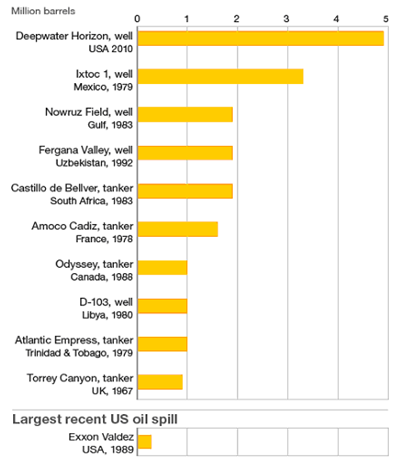
The intensification of the anti corporate activism on ecological and human rights topics has generated an enormous transformation in corporate approach to societal and ecological matters.
The anti corporate retaliation continued to amplify gradually along with time, which went at its utmost altitude in 1995, when the public eye fell on Shell – in that financial year the oil-corporation stood guilty of its attachment with implementation of Ken-Saro-Wiwa and 8 other campaigners, and inundated by Greenpeace over the resolution to submerged Brent-Spar oil platform (Manby, 2000).
Instantaneously, Shell Corporation let down the trust of its shareholders and the clients and stimulated hundreds of thousands of profit-making firms all through the corporate world about the essentiality of public-goodwill and the aptitude of activists to destruct that; hence, a policy to induce the public that firms played an imperative and evocative task in civilization was crucial.
Manby (2000) argued that the oil-businesses required a drastic revolution to stride forward to societal responsibility, Shell, today’s oil giant, soon after this incident, turned into the foremost big business to produce a CSR report on an annual basis.
Subsequently, the concept of corporate social responsibility came into sight like an unswerving rejoinder by businesses to eradicate corporate activism and stains over the goodwill imposed by campaigns; CSR at present symbolizes an achievement for businesses in invigorating their public-repute and reconciling the issue-space around the communal and ecological influences of businesses.
The Extent to Which CSR is Valued in Organisations
Tuodolo (2009) recommended that inattentive or ignoramus attitude towards the responsibilities that obligate oil corporations to be socially answerable, can lead to serious damage to the company’s name resulting in loss of public reputation, and therefore adversely affect the company’s sales and revenue.
The following figure shows some former cases where such damage to reputation occurred due to the failure of some oil giants to think and act responsibly while carrying out their operations:
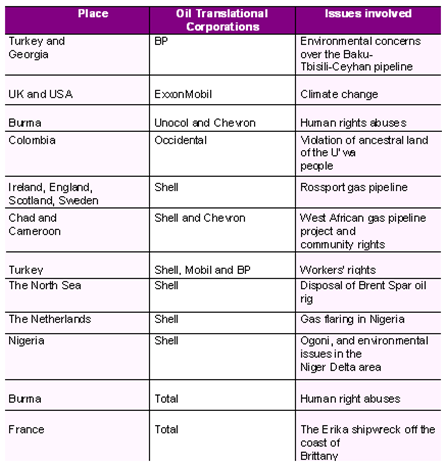
Putting high level of concern over the social liabilities like emphasizing on the communal, environmental, and stakeholder issues could resolve the dilemmas faced by oil corporations like Shell, ExxonMobil, BP (as shown in the above figure) by restoring the goodwill of the organisation and stabilizing the revenue. This is one of the main reasons of why currently CSR is so much valued to modern oil producing organisations.
CommDev (2010) demonstrates that in recent years, CSR has great importance in organisations; the evidence of this statement lies behind the fact about ecological enhancements afforded by a historical comparison of oil-spills from oil-tankers at ocean- from 1970s, the number of huge oil-spills (over 700-tonnes) caused by oil-tankers reduced from 25.2-spills annually (1970-1979) to 3.4-spills annually (2000-2008).
Nevertheless, the BP oil-spill in the Gulf of Mexico in 2010 financial year is an exception to this statistics.
The quantity of oil-spills also diminished appreciably throughout past couple of eras, these developments might not have occurred exclusive of governmental-pressures, for instance, to launch double-hull-tankers; however, these are impressive developments and some businesses have lowered their own greenhouse gas-productions; in 1997, BP settled an objective of lessening GHG-emissions from its operations by 10 percent from 1990-levels by 2010.
Following launch of an internal cap-and-trade scheme in 2000, it attained the objective in 2001; nonetheless, development has not been equal throughout the oil-industry – in 2002 to 2006, BP’s GHG-discharges lowered by 22 percent, and during the same time, Petrobras’ discharges raised by 66 percent, in spite that the corporation’s petroleum and natural gas manufacture raised by lower-rate.
Nor CSR has any definite characterization in the study zone and neither is it an obvious configuration of managerial practice; the primitive inspiration behind CSR is that corporations has a commitment to work for collective betterment; this compulsion acts as a constant function of the company’s operations (Tsoutsour, 2004).
CSR is in a budding period and it works as an parasol for many such related concepts; it is still an nascent and debatable concept and the identity for CSR has been vindicated by researchers on different grounds using financial, premeditated, legalistic, and moral arguments; furthermore, the financial performance of socially responsible organizations use to be far better than others.
Corporation’s goal always engages a profit motive, because they would by no means continue to operate if the shareholders do not obtain favourable profit on their investment; different ways to obtain profit relies on the corporation’s focus, and its stakeholders are vital for a long-lasting profit orientation (Godfrey, Hatch, and Hansen, 2010).
As a basis for an apposite classification of CSR it is necessary to concentrate on economics, moral values, politics, and social incorporation- this hypothesis is enthused and ingrained in characteristics that has observed in any societal system, for instance, adapting to the ecology, objective attainment, and social-integration.
Godfrey, Hatch, and Hansen (2010) argued that this perspicacity points out that CSR have either a monetary target with a profit-motivation or an ethical-focus with a promise for societal advancement; this observation polarizes the argument and diverts concentration from the room where economics and ethics assemble and where prospective elucidations exists.
In this context, the extent to which organisations impose appreciation over integration and implementation of CSR mostly depends upon typical economic factors.
Companies are now rethinking CSR as an intensification prospect rather than just a dictatorial observance or charitable effort; a large number of corporations are currently focusing on CSR activities to engender new income spills and above half of those considers that CSR has already endowed them with an advantage over their competitors (Roman, Hayibor, and Agle, 1999).
Numerous rationales exist for which firms suppose CSR to enlarge incomes; for instance, the rising interest among consumers induce them to apply internet to disseminate themselves with a extensive variety of communal issues, subsequently, they become familiar about the CSR trials of the corporations- this works as a endorsement-factor to increase sales influencing the valuation of CSR practice in firms.
With changing views and rising consciousness among major oil giants, integration and implementation of CSR is today the trend that firms conform to – complying with the corporate code of conduct or having regard to CSR can induce improved economic performance, which is also a ground of why organisations place so much emphasize in this issue (Roman, Hayibor, and Agle, 1999).
Nonetheless, this is an exceptionally rigid aspect of CSR and it lacks the fact that firms as Enron may join with munificence while being chargeable of moral wrongdoing (the Enron mortification uncovered in October 2001, which ultimately led to the bankruptcy of the firm).
Thomas and Nowak (2006) argued that the Enron crush is a souvenir that the deviation between social accountability and profit making is not at all far away in a progressively feisty picture of worldwide trade practices.
There is an affirmative correlation flanked by corporate social performance (CSP) and corporate financial performance; the CSP in reality lessens the fiscal risks, which an oil-company might confront in future owing to its disreputable conduct (Thomas and Nowak, 2006).
Oil corporations of each stage could acquire financial advantage by attainment of additional revenue from socially responsible activities; while it is hard to reveal the causal relation between CSR measures and revenues, an inclusive benefit-cost analysis of CSR by Cooperative Bank of United Kingdom affirmed that amid fifteen to eighteen percent of pre-tax profits staunchly comes from firm’s moral attitude.
The question that whether the motive for oil firms to value CSR in their business lies behind an intention to augment revenue level is debatable.
Orlitzky, Schmidt, and Rynes (2003) argued that public’s purchase of shares has no drastic affect by the firm’s altitude of societal liability and CSR practice does not eventually manipulate a firm’s share price; undoubtedly, share price is the merely evaluation of profitability and it has believed that, classification, capacity, and data problems subsists for assessing social responsibility and financial performance.
When it comes to corporate financial investment in CSR, it has supposed that there is some face of CSR, which could boost revenues while satisfying the demand for CSR coming up from various stakeholders; furthermore, cost-benefit analysis can resolve the idyllic level of CSR (Orlitzky, Schmidt, and Rynes, 2003).
In reality, CSR programmes are not far-flung to indulge the expectations of global community in a true sense; as corporations are profit-seeking bodies; their central purpose is to attain higher revenues.
During previous couple of decades, quite a lot of gigantic firms underwent from tremendous brand blemish as a consequence of deplorable moral conducts; for illustration, firms like BP by the gulf of Mexico scandal, ExxonMobil by Alaskan Oil Spill, and numerous such other cases too (Mahon and Griffin, 1999).
Mahon and Griffin (1999) also stated that such scandals and bad image to brand mark regularly caused substantial losses to those oil giants that consecutively harmfully influenced turnovers; consequently, their share prices started to lower down.
In such context, the present business world is increasingly focusing more on CSR practices and consequently increasing the extent to which every oil corporations are valuing the concept.
A commercial CSR scheme bolsters corporate answerability to shareholders and corporate liability to all other stakeholders; it is an indispensable constituent of a flourishing and sustainable corporate approach, averting societal and biological plights while optimizing conditions for long-standing profitability; it is a bond between innovation, profit-generation and collective advancement- the more unsullied the bond, the more continuous revenue has made.
The underlying association between corporations and community has systematically handled on the foundation of CSR research that facilitates the perspective of essential situations for an enduring fruitful firm, consequently, CSR is an incorporated administrative device for long-term source of opulence and advancement whilst supporting short-term goals in the areas of government relations and commercial interactions.
Research Methodology
Introduction
The purpose of this chapter is to design research methodology to formulate this paper with right direction. In order to organise this study, the author will pursue the major steps of Malhotra, as it will be easier for the author to follow this approach.
In contrast, the single case study approach of Yin is difficult to understand while research questions starts with “how” and “what” (Yin, 2002, p.6) and aim of the paper deals with several companies.
Research Approach
To organise discussion chapter, this study will consider descriptive research approach as this method tries to answer the questions regarding who, what, when, where, and how (Zikmund, 2006).
According to the view of Malhotra (2009) and Sekaran (2006), the quantitative and qualitative approach are the main research approaches while former one seeking the opportunity to quantify data by implementing some statistical module and 2nd one is an exploratory and unstructured process using small sample for providing general insights of the problem or rely secondary sources.
To formulate this study, the author will give more importance on qualitative research, because it would provide the clear perception of the CSR practices between European and Azerbaijan oil corporations.
It is important to mention that the author will not ignore quantitative research approach because primary data will help to assess the current position of CSR and find out the difference between CSR practices among oil companies of selected region.
Primary research
According to the view of Saunders, Thornhill & Lewis (2006), primary data analysis is important, as it is an important tool to determine the research problem and find out possible solution.
It has already stated that the author will concentrate on quantitative research; as a result, he will collect data from the lower ranked employees of the European oil companies because the top-level managers of multinational oil companies have no time to give their opinion.
However, the researcher has selected the employees of eight famous multinational oil companies those have operation in Azerbaijan as well as European countries. The researcher has prepared a table to provide a clew view about the respondents.
Table 1: – Respondents from the companies. Source: Self generated.
However, the researcher would like to use such numerical data to demonstrate how CSR affected environmental issues, communication issues, consumer, employee issues etc. after its taking into account when managing the corporations.
Secondary Research Approach
Cohen, Manion & Morrison (2007) and Yin (2003) expressed that Secondary data are processed data that already exist and acted as a main source of information for the preparation of this research work. At the same time, Saunders, Thornhill & Lewis (2006) mentioned that secondary data is reliable because these sources have already accepted by the universities, publishers, and other government organisations.
However, the researcher has decided to use secondary sources to organise entire paper excluding findings and results chapter. The author of this study will complete the paper considering journals, published books, e-books, some government publications, survey outcomes, and other important internet sources.
Field survey or Data Collection process
Cohen, Manion & Morrison (2007) argued that face-to-face interview or direct communication with the respondents is the best procedure in order to realize the problems as well as solutions. As the researcher has to collect data from different continents, the author would like to adopt more instantaneous method (for example, fax and e-mail) to avoid risk of delay, then the study would be more resourceful if he gets answer on time.
In addition, the employees of oil companies were very busy but they have positive intension to give feedback of the message, so e-mail would be an effective tool to collect data.
On the other hand, some respondents of Azerbaijan may prefer face-to-face interview; thus, the researcher aimed to take some interviews from Azerbaijan oil corporations according to their Corporate Social Responsibility practices based on the face-to-face basis as investigator is from Azerbaijan and familiar with the interview ethics of the country.
Importance of Secondary data
Corporate Social Responsibility is closely connected more with the theoretical issues, not that much with the empirical data; as a result, the researcher would like to use more qualitative data than quantitative data, which concerned with the exact numbers though findings chapter quantify some specific CSR issues.
In this case, the researcher has influenced by the opinion of Cohen; as Cohen, Manion & Morrison (2007) further addressed that using of secondary data has many advantages since the information of these data sources is more reliable and easy to access along with comparatively low cost.
As a result, the author has formulated chapter three- methodology, chapter five- discussion, and chapter two- literature review along with other conceptual framework by considering the secondary data source though the information related with the differences in CSR practices between European and Azerbaijan oil corporations was not sufficient to explain the identified research dilemma.
Questionnaire Design
The researcher will collect necessary data by using questionnaire, this kind of research requires survey report from large number of respondents; therefore making a questionnaire is the best option. Malhotra (2009) stated the advantages of questionnaire by saying that data collection through questionnaires is the cheapest option and it is data easy to quantify.
Cohen, Manion & Morrison (2007) argued that it helps to save our precious time and maintains coherence of the research. According to the view of Malhotra (2009, p.281), the respondents will provide quick response on the research topic if the researcher serve questionnaire. They further addressed that questionnaire designing is not a science; as a result, the research has option to show his uniqueness to do so.
Before attempt to design a questionnaire, the researcher will go through the secondary data sources to get more idea about the CSR practices of oil companies of Azerbaijan and EU zone. To co-ordinate this paper, questionnaire has organized on the context of four different stages that would enable respondents to cope with the questions easily.
Table 2: – The questionnaire design procedure. Source: – Self generated.
Data Analysis process
After collecting survey report from respondent, the researcher will scrutinise the paper in order to check the variables to eradicate fabricated information to carryout the data analysis.
In this stage, the author intends to analyze the data with graphical representation in findings and results chapter by using Microsoft Excel software. Researcher needs more concentration on secondary data, as researcher will organise the discussion and literature review considering secondary resources.
Limitation of Data Collection Process
Lack of response rate, inadequate shortage for research, and communication problem with respondents, available irrelevant primary data, and limited budget for the research, knowledge gap, and fabricated secondary data were the key constraints of data collection procedure.
Findings And Results
The key concern of the findings chapter is to explore the results of the real survey in order to appraise and estimate the differences in Corporate Social Responsibility (CSR) practices between European and Azerbaijan oil corporations and the extent to which CSR is valued.
Section A: About Respondents
Name of the Employees
This was a general question necessary to introduce with the respondents of the survey.
Sex of the Employees
This was also a common question inquired to the workers to start the survey with; however, this question also assisted the researcher to take a perception about any distinctions made between the quantity of male and female employees, because eradicating discriminations in recruitment is an element of social responsibility of a company. As per the survey result, 60% of the respondents were male, whilst 40% employees were female.

Company’s Names of the Employees
The researcher has completed the entire survey amongst 80 employees, out of which 10 were from BP, 10 from Shell, 10 from ExxonMobil, 10 from SOCAR, and 40 from other 4 oil corporations uniformly.
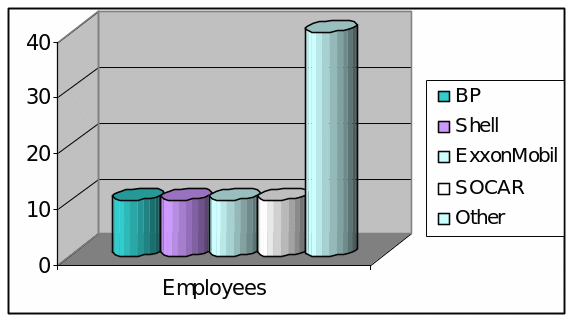
Nationality of the Employees
The researcher has repeatedly inquired this question to all the staffs with intention to determine the attendance of the workforce from all over the globe in the Azerbaijan oil companies.
The occurrence of a large sum of workers from EU nations would mean that there are many foreign direct investors in the country. Amongst the interviewees, 60% employees were from Azerbaijan whereas 30% was from Europe the rest 10% from other countries.

Years of Experience of the Employees
Finding out the experience altitude of the personnel is imperative in the assessment process of the feedbacks as it assists to discover the most precise and dependable answers.
It is arguable that the survey has suggested that the numbers of employees with experiences below five years and with experiences between five to ten years are more than that of employees who are experienced over fifteen years. Amid all the respondents, 50% employees had an experience of less than 5 years, 35% respondents had experience between 5 and 10 years, and 15% employees had experience for more than 15 years.

Section B – Respondents’ View
Whether the Employees Know the CSR Practices of Their Company
If the employees have knowledge about the CSR practices of their respective organizations, this would indicate the extent to which the multinational oil corporations give privilege to this issue and how serious they are in making every person related to with business familiar with CSR practices.
The survey has identified the fact that 90% of the employees know the issues of CSR whereas 10% employees have no idea about their employer’s social responsibilities.

Result: A major number of the workers from different companies around Azerbaijan oil industry are aware about the issues of corporate social responsibility in theirs firms.
Whether the Employees Think CSR Create Ethical Dilemma in Workplace
This question aimed to know whether or to what extent the organizations had been successful in introducing a CSR policy for the workplace which can in true sense provide helpful assistance to the personnel engaged with the business instead of creating a CSR-policy to use it like a shield to safeguard corporate-reputation rather than eliminating ethical dilemmas in workplace.
However, the survey carried out in the Azerbaijan’s oil industry illustrates the fact that most of the staffs do not face any ethical dilemma in workplace. Among the total respondents, 80% employees disagreed with the fact that CSR create ethical dilemmas in workplace whereas 15% employees agreed and only 5% respondents refused to comment anything on this.

Result: The result shows the fact that in most oil corporations CSR practices do not create any dilemmas in workplace; however, a few number of the employees have reported to suffer from such dilemmas.
Whether the Employees Think CSR Is the Tool to Increase Revenue
The researcher aimed to identify any differences in the CSR practices between the Azerbaijan and European oil corporations. This was to find out that whether European oil corporations use CSR as a device to augment profits and whether the tendencies of the Azerbaijan-based corporations have been similar.
However, the survey suggests that local Azerbaijan-based corporations are still quite inexperienced in using this as a tool to raise profits. Among the total respondents, 60% employees in Azerbaijan believe that CSR is not such a tool, whilst 35% respondents agreed to the fact. Only 5% respondents have not commented anything to the question.

Result: It is arguable that amongst the 60% employees who disagreed to the point were from Azerbaijan-based corporations while the rests were from other international organizations. This indicates that the profit motive behind the integration of CSR is one of the differences between the Azerbaijan and European businesses.
Whether the Employees Think Their Oil Companies Merely Consider CSR as “Beyond Compliance”
According to 50% respondents, their respective organizations consider CSR as “Beyond Compliance” and according to the rest 40%, their firms seemed to be seeing CSR in the opposite way; nonetheless, 10% employees have not given any views on the issue.

Result: Although a large number of employees agreed that their firms believe CSR to be beyond compliance, a good number of those representatives of some oil corporations do not think their companies to consider CSR in such a way.
Whether the employees think CSR Management System Helps To Reduce Pollution
Reduction of pollution levels remains one of the key objectives of the CSR policy of many organizations.
The answers to this question would help the researcher to come to know about any dissimilarity between the CSR practices in terms of pollution reduction in the companies; being the companies’ representatives, employees would appreciate or depreciate the idea that CSR management system could reduce pollution depending on the attitude of their respective companies towards this concept.
At least 75% of the respondents argued on the light of their experiences of working together with the managers that good management of CSR can help to diminish organization’s effects on environment. On the other hand, 25% respondents stated that in reality, CSR rarely plays any role to reduce pollutions.

Result: Socially responsible behaviour from the companies, according to maximum respondents, can play significant part to lower down pollutions. This indicates the fact that a good number of Azerbaijan-based firms do appreciate the idea that CSR mechanisms could diminish pollution levels.
Section C
Do MNCs Show Different CSR Management System for Different Countries
This question was put forward to the employees to find out whether the MNCs discriminate between countries in terms of implication of CSR. Among total respondents, 20% respondents strongly agreed that their companies differentiate between CSR management systems whereas 30% agreed, 35% disagreed, 10% strongly disagreed, and 5% were neutral.
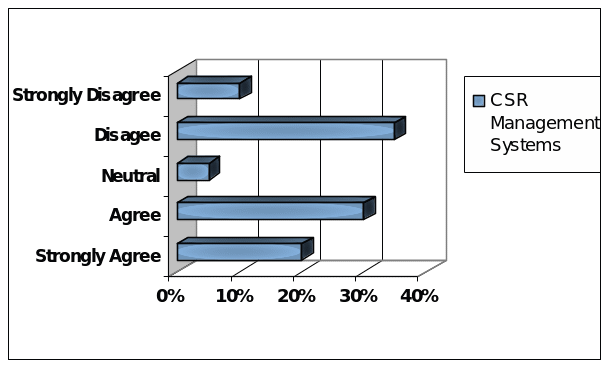
Result: The result shows the fact that a number of companies are present in the Azerbaijan’s oil industry that places some inequities in imposing CSR guidelines in other countries
To What Extent the Employees Agree That MNCs Concentrate Less on Host Countries (Like Azerbaijan) To Implement CSR
Through this question, the researcher wanted to identify whether a reason behind the differences between CSR practices in the Azerbaijan and European oil corporation is the negligent attitude of the MNCs to work for the social welfare or environmental issues in the countries outside of the parent company.
The survey has suggested that 25% employees strongly believe that MNCs concentrate less on host countries like Azerbaijan to implement CSR whereas 35% employees have agreed to this and 5% respondents was neutral. Amongst the rest 35% employees, 30% respondents have disagreed to this and 5% interviewees have strongly disagreed to the question.
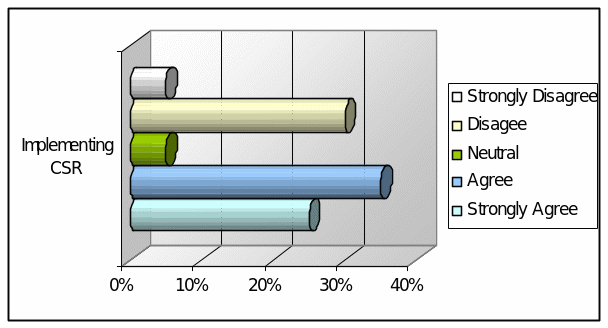
Result: According to majority of the respondents, MNCs, to certain extent, concentrate less on host countries to implement CSR over there than the home countries.
To What Extent the Employees Agree That MNCs Are Engaged With Corruption In Case of Giving Fund to Government
This question was frequently asked to the respondents in order to know whether there are any differences between the corporations in terms of behaving ethically with all the business stakeholders as well as the government and to find out if any corruptions occur within the organizations.
5% employees have strongly agreed to the fact that MNCs are engaged with corruption in case of giving fund to government whilst 20% employees have agreed, 25% employees was neutral, 35% employees disagreed, and 15% employees have strongly disagreed.

Result: Being the MNC’s representatives the major part of the respondents tried to point out that their companies are corruption free in terms of giving funds to government; however still a few of them have agreed to this.
To What Extent the Employees Agree That Oil Companies Provide Adequate Remedy for Accidents or Damages
This was to find out whether or to what extent the employees has satisfied with their employers’ responsible attitudes toward themselves and also to recognize any differences to this type of ethical behaviour between the Azerbaijan-based corporations and other MNCs.
However. 5% respondents have strongly agreed to the fact that the oil companies provide adequate remedy for accidents or damages to the workers whereas 40% employees have agreed, only 5% employees was neutral, 35% employees disagreed, and 15% employees have strongly disagreed.
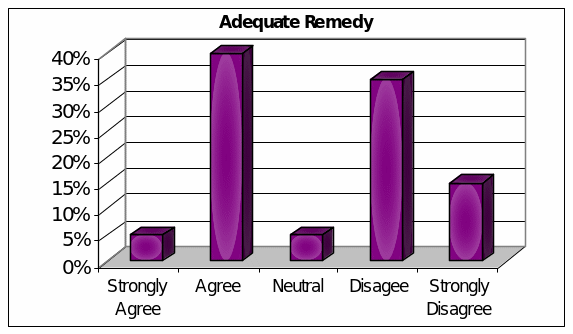
Result: There was a mixed reaction amongst the respondents to the answer to this question. Many of them are happy with their companies’ packages for compensations, whilst some of them have dissatisfied.
To What Extent the Employees Agree That the European Oil Companies Should Consider CSR for Foreign Operation
Through the question, the researcher aimed to discover if the employees in Azerbaijan feel serious about the implementation of socially responsible activities universally and uniformly throughout all the nations in which a company operates in. It is sometimes argued that the employees of the EU-based oil corporation are quite open-minded in the issue of considering CSR in foreign operations.
The attitudes of every employee towards CSR are important as those can influence the ways of CSR practices in different organization. Therefore, the answers to this question would also help to identify the differences between the views of the employees of Azerbaijan and Europe-based organizations and the extent to which these employees value the concept of CSR.
More than 35% respondents have strongly agreed that the European oil companies should consider CSR for foreign operations while 45% have agreed, no one was neutral, 15% disagreed, and merely 5% have strongly disagreed.

Result: A large number of the employees believe that it is important for the multinational corporations to consider CSR in their foreign operations. Therefore, it is noteworthy that there is no big difference in the personal views of the European and Azerbaijan’s oil industry workers in terms of practices of CSR.
Discussion
Background of European CSR
Schutter (2004) pointed out that the modern journey to Corporate Social Responsibility by the European Union has stated from 2001 while the Commission invited public opinion the Green Paper concerning CSR.
Gatto (2002) mentioned that in 2002, to responds to the emergence of global standard CSR practice EU introduced MSF (Multi-Stakeholder Forum) integrating the representation of workers union, business communities and civil society with the aim to deliver mainstreaming excellent practices of CSR and to gaining resourceful and crystal clear communication for CSR practices by means of appropriate tools.
The MSF worked up to 2004 to produce a report integrating the stakeholders’ queries and to respond the queries; the CSR Communication of EU produced a landmark report designing Europe as a region of excellent CSR practice that put together the social and environmental concerns of business communities and their communication with the CSR stakeholders on a deliberate starting point.
Nevertheless, protest against voluntary integration of business entries on CSR practice stated by the nongovernmental organization and urged for legislative building for such practice (Gatto 2002).
As a respond to the conflicting situation with CSR practice, in 2007, the European Parliament urged the EC to enlarge the legal compulsion to a number of major issues of corporate accountability involving factors like directors’ duties, obligatory exposure for lobbyists as well as overseas direct liability and this resolution had passed with a greater majority in the parliament.
The EC did not re-think its stand on CSR and expressed it previous views that the CSR is an exceptionally voluntary measure that may not be keeping pace at EU level on obligatory basis. Concluding all conflicting situation in 2008, the ECCJ (European Coalition for Corporate Justice) presented a legal proposal that has integrated a foundation for the corporate accountability structure for European Union (Skjærseth et al 2004).
Gregor and Ellis (2008) addressed that the ECCJ has organized the legal briefing to rejoinder to the up to date EP (European Parliament) resolution on CSR with the aim to facilitate greater legislative opportunities to progress corporate accountability for CSR practice within the European Union and to preventing corporate abuse. The major areas of reformation in this regards has identified as follows-
- Extending the opportunities to impose direct liability of parent companies,
- Setting up a guidance regarding the Parental Company’s Duty of Care,
- Introducing mandatory environmental and social reporting system for the corporate entries.
Gregor and Ellis (2008) also added that the Multinational Enterprises lead their business operation like a single economic unit by bringing together with several separate legal persons while the identical conceptual framework of separate legal personality as well as limited liability protects all members of the organization from civil and criminal obligations.
The core essence of company law has facilitated this scope to protect entrepreneurs from financial risk and to encouraging further investment but such opportunity has generated dual role for MNEs (Multinational Enterprises) to gaining profit from the subsidiaries without caring for environmental hazards and human rights violation due to their operation.
ECCJ urged to sharing the responsibilities of such violation by the MNEs suspending the belongings of the doctrine of separate legal personality in this regards.
Gregor and Ellis (2008) pointed out that within the existing European laws the concept of duty of care for the MNEs connecting to their affiliates operation has restricted to definite state of affairs where the MNEs are directly mixed up with the operation or else while making decision of the subsidiaries.
There is enough evidence that MNEs are resolutely influencing some operations of different legal personalities who are not properly component of that MNE but correlated with that entry connecting its supply chain where the duty of care urged to impose for human rights and the environmental concerns.
ECCJ also urged to impose ESR (Environmental And Social Reporting) practice for the MNEs to ensuring transparency and accountability connecting their compliance with environmental and human rights standards as an obligatory manner rather than voluntary involvement.
CSR Practice by the Oil Companies in Europe
Boasson, Wettestad & Bohn (2006) has conducted a research on the complaisance of CSR practice of Oil companies in Europe and attempted to make it clear that the oil companies are mostly reluctant to complying with CSR standard until the legislative bindings adopted.
The outcome of the research demonstrated that the companies possibly would not have the same opinion with European Commission while the major emphasis of policy makers concentrated on CSR has to be use as a tool of accomplishment of compliance to the mandatory social along with environmental legislation.
It is also anticipated that all the companies would publicly exhibit their CSR stand through their corporate vision statement but the reality was that the companies’ accomplishment involved with publicity rather than achievement based performance.
It is evidenced that the oil companies in Europe have involved with tremendous corruption but most of them have taken notable initiatives to mitigating hazards of climate changes as well as reducing the risk of explosions, carbon emulsion and chemicals uses.
Though there is no ranking profile to measure the standard of CSR practice but all the oil companies has incorporated social and environmental issues in their corporate strategies and some of them have generated very specific policies for target setting and achieving those objectives.
Boasson et al (2006) also added that to some extends, the oil companies in Europe have already well equipped with the CSR instruments and at a glace it looks very impressive where they introduced ISO 14000, complied with OECD Guidance and integrated IT based observation as well as online reporting.
Such reorganisation of CSR by the oil companies indicated that their diversity has suitably matched with a number of exact activities and practice of CSR though there is lack of board level integrity and it is not clear the honest expression or strategic initiative to bypass their ultimate responsibilities towards society and environment.
In recent years, there is some ongoing study on the CSR practices in Europe, those indicated that the oil companies emphasised on signal point priority upon CSR conveying internal responsibilities rather than verified data presentation and high-level management integration.
It is also notable that a little number of the companies is willing to put the real picture of their possible instances where they have involved their investments for environmental concerns and how those contributions facilitated the society to overcome the hazards created by their operation.
There is enough publicity regarding the CSR practice of Oil companies in Europe but it necessities more study to identifying the achievements and to what extend CSR enabled to change the organisational behaviours of the oil companies.
Overview of Azerbaijan Oil Industry
Huseynov (2009, p.1) stated that Azerbaijan is one of the oldest countries where individuals learned how to produce oil, and Talwani, Belopolsky & Berry (1998, p.2) argued that the first offshore well had drilled in 1924.
Huseynov (2009) said that people used oil for medicinal and household needs, and Talwani, Belopolsky & Berry (1998, p.2) further addressed that the soldiers like Alexander the great collected oil to use in their shallow hand dug wells. As a country of Caspian Basin, the onshore oil preservation and exploration is one of the major concern for Azerbaijan since 1980s, as the 70% wells of Azerbaijan has been used up for more than thirty years.
Comparison of CSR Practice in Europe & Azerbaijan
UKACF (2009) pointed out that the alliance of Azerbaijan NGOs have expressed suspicion deals of SOCAR, the state owned oil concern and identified that it has ostensibly aliened to sign several contracts with multinational oil companies without complying with the general procedure of governmental purchase which is totally illegal.
For instance, the SOCAR has come into a secret agreement with an unpopular offshore company Global Energy for which the company and its subsidiary named Neftchala will hold 80% earning of oil fields of Azerbaijan but there is no clear justification publicly why they will get such shares. The Transparency international also demonstrated the lack of accountability in Azerbaijan and its high level of corruption scenario.
Karl (2006) identified that the literature of oil companies prefer the socio-economic condition like Azerbaijan or they criminalise the system of the oil producing countries with lack of education, poor democracy lower standard life style of the population, military interference and where needed war or civil war.
From the history of oil industry demonstrated in the earth where the oil companies taken entry for oil or gas exploration, they have destroyed the environment and created political unrest, civilian violence and military intervention that generate unstable situation for the oil dependant countries.
Oil dependency of a state would be measured by the volume of fuel export of that country as a percentage of total exports of the nation and according to the statistics of 2004; the oil dependence of Azerbaijan is 82.22%.
Azerbaijan have experienced Oil hindered democracy, oil economy has broken the relation connecting the taxation and public spending for welfare but involved to support deteriorating pressures for accountability and transparency while the country aliened with infant mortality, malnutrition, deprived life anticipation and very poor health care.
Under such circumstances, the corporate social responsibility of oil companies in Azerbaijan is just like a joke by the multinationals in relation to European CSR.
Wehner (2010) brought up the conspiracy of BP into light saying that this oil giant for its part made the sharing agreements to execute its strong monopoly on the Azerbaijan oil with a number of hosts all those are fake front companies with the ill intention or strategy.
The intention of going with agreement with illegal companies is that if anyone tries to break the monopoly of BP in Azerbaijan they have to face at least hundred of court cases due to all that false oil companies under local legislation.
Under the leadership of BP, the oil companies’ alliance in Azerbaijan AIOC (Azerbaijan International Operating Company) has driven with several projects from drilling, exploration, and transportation of oil gas to the western counties where the Baku-Tblisi-Ceyhan (BTC) Pipeline is a landmark project.
Starr and Cornell (2005) mentioned that in the BTC (Baku-Tblisi-Ceyhan) Pipeline Company, BP holds 30.1%, SOCAR owned 25.0%, Unocal belongs 8.9%, Statoil, 8.7%, TPAO gets 6.5%, Total shared 5.0%, ENI gets 5.0%, Itochu owned 3.4% ConocoPhillips shares 2.5%, Inpex gained 2.5%, Hess holds 2.40% and the objective is to transport oil cost-effectively to the refineries of Europe and USA.
The BTC pipeline prolonged up to 1,760 kilometres from tremendously rocky landscape and runs over Azerbaijan including other regions keeping dangerous impact on the crazily conflicting climatic as well as geological zones by creating a lot of noteworthy seismic unsteadiness to environment ecology as well.
The adopted technologies and chemical coatings used in this project is very harmful to the populace of this regions but such a vast scale project of about three billion dollars has been distributed 100% among the oil companies without keeping a signal percent shares for compensating the environmental hazards created by the project.
Therefore, where the people look for CSR practices of oil companies in Azerbaijan – may be in their web site or other marking propaganda but the oil companies have failed to demonstrate their CSR awareness by keeping a nominal share for compensating the environment.
Starr and Cornell (2005) also added that like BTC there are similar projects by the oil companies in Azerbaijan are ACG, Shah Deniz and SCP projects where BP argues that Azerbaijan would gain an annual revenue of US$ 100 million considering the oil price at the rate US $ 30 per barrel but there is no indication of compliance of CSR.
Not a single oil company of the Azerbaijani consortium has addressed what would be the environmental degradation cost for the country or how the oil companies would compensate the climate change issues generated from their operation.
For the above-mentioned pipelines would definitely affect more than three hundred villages of Turkey, just about all in the less developed eastern as well as south-central neighbourhood of Anatolia and at the same time they will also negatively impact on the Georgian and Azerbaijani poor communities who are not adequately prepared to protect and prevent their damages of oil companies.
Moreover, the oil companies accelerated the conflicts among the neighbours of the Azerbaijan rather than mitigating the dilemmas with surrounding countries, where Russia identified that the oil companies are best serving its interest without creating pressure. As Iran is out of the beneficiaries list of Azerbaijani, Iran discards its religious as well as cultural propaganda in opposition to Azerbaijan.
There are also some other regional pressure on Azerbaijan from China, Russia, and Turkmenistan where oil companies are interested to continue such disturbing pressures on the country while The major stupendous regional disputes continue living between the Azerbaijani-Iranian as well as Azerbaijani-Turkmen boundaries of the sea (Nurullayev, 2002)
As a demonstration of CSR practice in Azerbaijan on behalf of the oil companies, BP urges that almost everyone affected by the project implementation has offered a one-time opportunity to register their affecting issues with BP but people were confused regarding how to be register and where they have to go.
Before developing the awareness among the people, the registering process closed and people baked with disappointment and BP never responded to the demand of compensation of people. This is also another picture of CSR practice by the oil companies in Azerbaijan
The unwillingness of the oil companies to complying with the CSR practice standard of Home Counties, there are raising protest in Azerbaijan from the NGOs and they are legitimizing and seriously underpinning them in this process arguing that the oil companies are occurring serious harms of the nation rather than good.
BP has taken strategy to negotiate with such NGOs and purchasing them by providing funds for their social action measuring their effort would ultimately serve the purpose of oil giants. Against the NGO protest BP encounter vigorously that the oil deal would contribute the country with US$ 100 million per annum and create 12300 long and shot term employment opportunity that would lead the nation to go ahead.
The Guardian (2006) pointed out that in context of European CSR practice both BP and Shell play a role where they are eager to turn themselves as the leader of environmental pressure group and they spend a lot of money to pretend their clean image of environmental friendly company.
To do so the companies speak out brave stories of green power, wind power, and bio-fuel but forget to memorise that they are doing in Azerbaijan and rest of the world.
The Oil companies in Europe urged Tony Blair’s government to put into effect ‘the courageous leadership on climate change policies at home’ with the objectives to accelerate the conversion of a low carbon economy and to ensure to compensate environmental degradation.
The Guardian (2006) also added that the oil companies have become more transparent, supplementary approachable and less aggressive at their commitment to the home country or all over Europe but their impact of core business is almost same outside of Europe.
At the same interview, BP has confessed that agricultural land seizures and human rights is a common practice at their operation in Azerbaijan especially for the BTC pipeline project and environmental damages are a regular occurrence in this central Asian county.
Gulbrandsen and Moe (2005) mentioned that the CSR practice in Azerbaijan has presented various issues of the ‘paradox of plenty’ concerned with natural resources where reckless spending inflated the prospect of oil economy with pathetic failure of tax collection, accretion of loans and failure of improving other sectors simultaneously in relation to European CSR practice.
Dahlsrud (2006) addressed that in European context the CSR practice is the significance where the companies are enthusiastic to compete on CSR factors competitive to one with other but in Azerbaijan, the oil companies turned into a syndicate to violating human rights and avoiding environmental responsibilities.
Ross (2008) argued that European companies are eager to maximise value for their shareholders but they are well allied with CSR practice though it seems voluntary, but they consider CSR as a chain of value-maximization for the stakeholders that is out of practice in Azerbaijan due to lack of CSR policy and legislation.
To assess the integrity of CSR practice, the European Oil companies adopt PRESOR (Perceptions of the Role of Ethics and Social Responsibility), which is totally absent among the oil companies in Azerbaijan.
Aaronson (2009) argued that CSR practice can enhance the reputation of a business concern by strengthening the operation and generate marketing advantages in developed countries like Europe but for less developed countries like Azerbaijan there are risks that CSR could destabilize the good governance where business has on responsibility other than its core competencies.
Muttitt and Marriott (2006) explored that Azerbaijan is eager to be painstaking as a member of Europe Union and to breathe life into the cultural as well as diplomatic attachment with Europe and it has applied for members of EU and NATO in 1995 with the objectives to come out from CIS (Commonwealth of Independent States) under Russian leadership.
As the country allied with the most dominated US intervention, the strategic consideration of the country is against Russia and to some extend if the country get EU membership, the CSR practice of oil companies in Azerbaijan would extend to the standards of Europe.
Conclusion
Recommendations
From the above discussion, it can be argued that most of the oil companies of Azerbaijan have created by foreign investment and these foreign companies interfere in domestic affairs of Azerbaijan, such as, poverty and law and order situation.
Most of the case, Multinational companies suppressed host countries, for instance, the European companies like- British Petroleum claiming to have a broader social responsibility, but this company also criticised for political involvement.
The multinational companies should not differentiate their CSR policies for local and foreign market, as the above situation clearly demonstrates the differences in CSR practices between European and Azerbaijan oil corporations.
On the other hand, the European oil companies claim that their operations mainly benefit the countries in which they operate, but they do not fully concentrate on the affect of their operation on the public in host countries. Therefore, the companies should equally treat all countries where they operate, for example, BP has established regional ethics committees.
The management of the companies should consider the practical outcomes of their CSR practices as most of the companies theoretically demonstrate that they are concern about social issues, for instance, BP and Shell have taken initiatives to incorporate CSR into their management systems but still people are adversely affecting for their activities.
In addition, the management should have accountability for their activities.
In order to avoid adverse impact, the companies tried to hide their confidential and crucial information about CSR response from the media by saying that they would highlight the position of CSR in sustainability reports, ethical codes and annual report.
The environmental protection agencies should develop political and social movements to force the government to make effective rules and regulation;
However, the researchers should more concentrate on corporate social responsibility to minimise the present ethical problems as this field is still a subject of controversy in case of implementation process.
Local and smaller Azerbaijani oil companies generally have a less developed community strategy and less concern for social and environmental dimensions of their operations; as a result, the large multinational oil corporations show better performance while corruption is concern.
The government of backward country should develop awareness programme, as people of European countries are more conscious about the ecological and social standards, but Azerbaijani people have some limitation in this area. As a result, Azerbaijani experienced more problem with environmental pollution, corruption, and accidents.
However, in order to reduce the gap of CSR practices in Azerbaijan oil companies, it should take help from Asian (Iran, and India) and European countries (Turkey), which would not concentrate on power practice. At the same time, Azerbaijan should attempt to develop its routes, as the existing pipelines are only able of getting a small portion of the area’s oil and gas wealth to global market.
If the employees or public injured for any severe accident, then the multinational oil companies deny paying sufficient remedy and they argue that parent company is liable for the incident. This mechanism helps the foreign companies to suppressed Azerbaijani people, but European people are well protected by EU law.
EU law is applicable for all member states, so, the multinational oil companies strictly follow the rule and regulation regarding environment, public health and other CSR issues while they operate the business in European countries.
However, Azerbaijan is an Asian country, therefore, the multinational can adopt different policy for the operation in this region, which should protect immediately by implementing strict government policy.
In addition, the attitude of European oil companies should change in case of foreign operation as the ultimate goal of European oil companies is to maximize profit.
In this circumstance, the government of Azerbaijan should encourage multinational companies to collaborate their activities with local companies to serve mutual interests; for example, in 2000, British Petroleum in partnership with Statoil, and the UK based NGO International Alert, established the Enterprise Development Committee (EDC) in order to assist local business progress.
The government of Azerbaijan should take more initiative to reduce the corruption, such as, the Extractive Industries Transparency Initiative (EITI) NGO coalition in Azerbaijan has established in order to develop transparency of payments made by extractive industries companies to the host government.
On the other hand, the key fault of EITI is the lack of reporting and monitoring of the government’s expenditure of oil revenues; therefore, these organisations should develop their monitoring policy to increase CSR practice and reduce corruption by imposing pressure on the parties to consider the CSR issues in practical sense.
Conclusion
This dissertation examined the difference in CSR practices between European and Azerbaijan oil corporations.
In the pace of rising competition in the oil industry, the major market players are increasingly optimising themselves with the virtues of corporate social responsibilities; although, until a certain period of time the trend of integrating CSR seemed to be one sided for the European multinationals, but now CSR adaptation has recognised by every second oil company throughout the world.
After considering the above discussion, this paper recommended that the central Asian country Azerbaijan should try to expend regional cooperation with the neighbouring countries rather than European countries, the United Stated or G8 countries in order to protect any aggressive interference on the Oil industry and other petroleum resources.
Reference List
Aaronson, S. A. (2009) Corporate strategy and inadequate governance: The pitfalls of CSR. Web.
Amos, J. (2010) Gulf oil spill volume estimated from video. Web.
Boasson, E. L. Wettestad, J. & Bohn, M. (2006) CSR in the European Oil Sector A Mapping of Company Perceptions. Web.
Carroll, A. B. (1999) Corporate Social Responsibility Evolution of a Definitional Construct. Business & Society, 38 (3). Web.
Cohen L., Manion, L. & Morrison, K. (2007) Research Methods in Education. 6th ed. New York: Routledge.
CommDev (2010) Oil industry’s increasing focus on CSR. Web.
Dahlsrud, A. (2006) A comparative study of CSR-strategies in the oil and gas industry. Web.
Frynas, J. G. (2006) Corporate Social Responsibility in Emerging Economies. Web.
Frynas, J. G. (2007) The false developmental promise of Corporate Social Responsibility: evidence from multinational oil companies. Web.
Gatto, A. J. C. (2002) The European Union and Corporate Social Responsibility: Can the EU Contribute to the Accountability of Multinational Enterprises for Human Rights? Web.
Godfrey, P. C., Hatch, N. W., & Hansen, J. M. (2010) Toward a General Theory of CSRs: The Roles of Beneficence, Profitability, Insurance, and Industry Heterogeneity. Business & Society, 49 (2). Web.
Gregor, F. & Ellis, H. (2008) Fair Law: Legal Proposals to Improve Corporate Accountability for Environmental and Human Rights Abuses. Web.
Gulbrandsen, L. H. & Moe, A (2005) Oil Company CSR Collaboration in ‘New’ Petro-States. Web.
Gulbrandsen, L. H. & Moe, A. (2007) BP in Azerbaijan: a test case of the potential and limits of the CSR agenda? Web.
Hemming, J. (1998) The Implications of The Revival Of The Oil Industry In Azerbaijan. Web.
Huseynov (2009) Oil Policy and Strategy of Azerbaijan. Web.
Husted, B. W., Allen, D. B., & Rivera, J. E. (2010) Governance Choice for Strategic Corporate Social Responsibility: Evidence From Central America. Business & Society, 49(2). Web.
Kapoor, S., & Sandhu, H.S., (2010) Does it Pay to be Socially Responsible? An Empirical Examination of Impact of Corporate Social Responsibility on Financial Performance.Global Business Review, 11(2). Web.
Karl, T. (2006) Oil & War. Web.
Mahon, J. F., & Griffin, J. J. (1999) Painting a Portrait: A Reply.Business & Society, 38(1). Web.
Malhotra, N. K. (2009) Marketing Research- An Applied Orientation. 5th ed. Prentice-Hall of India Private Limited.
Manby, B. (2000) Shell in Nigeria: Corporate Social Responsibility and the Ogoni Crisis. Web.
Montiel, I. (2008) Corporate Social Responsibility and Corporate Sustainability: Separate Pasts, Common Futures.Organization & Environment, 21 (3). Web.
Muttitt, G. & Marriott, J. (2006) Some Common Concerns: Imagining BP’s Azerbaijan-Georgia-Turkey Pipelines System. Web.
Nurullayev, R. (2002) Political Culture & Challenges in Azerbaijan: Past, Today & Future. Web.
Orlitzky, M., Schmidt, F. L., & Rynes, S. L. (2003) Corporate Social and Financial Performance: A Meta-Analysis. Organization Studies, 24(3). Web.
RARE (2006) CSR in the European Oil Sector: A Mapping of Company Perceptions. Web.
Roman, R. M., Hayibor, S., & Agle, B. R. (1999) The Relationship between Social and Financial Performance: Repainting a Portrait. Business & Society, 38(1). Web.
Ross, S. M. (2008) Corporate Social Responsibility Marketing Communications of American And Western European Multinational Enterprises: A Longitudinal Study Of Stakeholder Engagement. Web.
Saunders, M., Thornhill, A. & Lewis., P. (2006) Research Methods for Business Students. 4th ed. London: FT Prentice Hall.
Schutter, O. D. (2004) The Accountability Of Multinationals For Human Rights Violations In European Law. Web.
Sekaran, U. (2006) Research Method for Business. 4th ed. John Wiley & Sons, Inc.
Sen, S. K., & Swierczek, F. W. (2007) Societal, Environmental and Stakeholder Value Drivers: A Case Analysis of US and Asian International Firms. Journal of Human Values, 13(2).Web.
Skjærseth, J. B. Tangen, K. & Swanson, P. (2004) Limits to Corporate Social Responsibility: A comparative study of four major oil companies. Web.
Starr, S. F. & Cornell, S. E. (2005) The Baku-Tbilisi-Ceyhan Pipeline: Oil Window to the West. Web.
Talwani, M. Belopolsky, A. & Berry, D. (1998) Unlocking The Assets: Energy And The Future Of Central Asia And The Caucasus. Web.
The Guardian (2006) The Rebranding Of Shell And BP Is A Fraud. Web.
Thomas, G., & Nowak, M. (2006) Corporate Social Responsibility: A definition. Web.
Tsoutsour, M. (2004) Corporate Social Responsibility and Financial Performance. Web.
Tuodolo, F. (2009) Corporate Social Responsibility: Between Civil Society and the Oil Industry in the Developing World. An International E-Journal for Critical Geographies, 8(3). Web.
UKACF (2009) International New, UK Anti-Corruption Forum Newsletter 2009. Web.
Wehner, C. D. (2010) BP Scandal. Web.
Yin, R. K. (2003) Case Study Research: Design and Methods. 3rd ed. Beverly Hills, CA: Sage.
Young, S. & Thyil, V. (2009) Governance, employees and CSR: Integration is the key to unlocking value. Asia Pacific Journal of Human Resources, 47(2). Web.
Zikmund, W. M. (2006) Business Research Methods. 7th ed. Orlando: Harcourt Publishers.